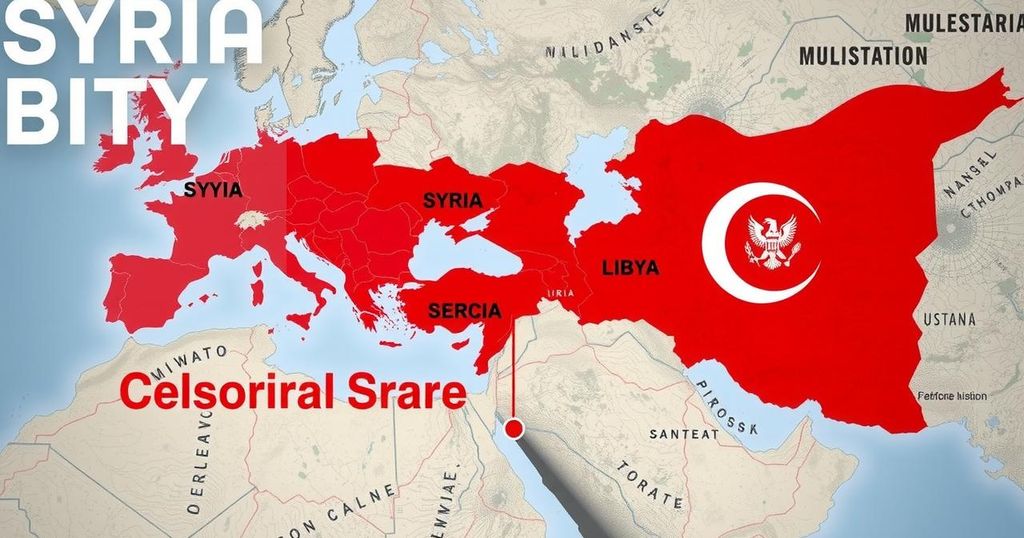Russia’s Strategic Pivot: From Syria to Libya and Implications for the West
The article details Russia’s strategic shift from supporting Syria to bolstering its influence in Libya, centering on the implications of this transition for Western powers. With Bashar al-Assad’s regime weakening, Moscow seeks to enhance ties with Khalifa Haftar. This highlights the fragility of alliances formed through coercion and the need for the West to reassess its engagement strategies in Libya to counteract Russian influence effectively.
Russia is orchestrating a delicate transition from Syria to Libya, signifying a strategic reevaluation following the fall of Damascus, which had long symbolized its assertive foreign policy. This shift highlights that alliances founded on coercion are inherently unstable. With the faltering of Bashar al-Assad’s regime, Moscow’s focus has begun to pivot towards Libya, where it aims to consolidate power through military and logistical support for Libyan National Army (LNA) Commander Khalifa Haftar.
The geopolitical landscape has shifted, reflecting Russia’s longstanding ambition in the Mediterranean, dating back centuries. The ongoing reliance of both Assad and Haftar on Russian backing demonstrates the transactional nature of their relationships. Moscow’s military interventions are not merely about support but are intricately tied to broader objectives of countering Western influence and expanding Russian strategic interests.
The West’s inability to secure a pro-active engagement with Libya has enabled external powers like Russia to leverage their influence. American and European efforts to detach Haftar from Russian support are misinformed, as he is highly dependent on Russian resources. Despite some attempts to confront this reliance, without comprehensive strategies aimed at enhancing Libya’s internal governance and economic stability, the West may inadvertently reinforce Russia’s foothold in the region, much like in Syria.
Moscow leverages its military capabilities to strengthen Haftar economically and politically, ensuring that the LNA remains subservient to Russian interests. This dependency mirrors past scenarios, where overreliance on foreign powers led to vulnerabilities within authoritarian regimes. The situation underlines the fragility of Haftar’s aims for independence and authority, leaving him susceptible to shifting geopolitical tides governed by Moscow’s strategic calculus.
In conclusion, the West must adopt a more holistic approach to Libya that transcends reactive measures, emphasizing the importance of supporting governance initiatives capable of countering external exploitation. A failure to act decisively can lead to repeating past mistakes evident in both Libya and Syria, where neglect and opportunism have undermined regional stability. The need for a robust strategy is essential to ensuring that foreign influence does not dominate Libya’s political landscape.
The article discusses the evolving geopolitical dynamics as Russia transitions its focus from Syria to Libya. After the recent fall of Damascus, a critical stronghold for Moscow, the article examines how this shift illustrates the fragility of alliances based on coercion. It elaborates on the strategic implications of Russia’s support for Libyan Commander Khalifa Haftar and draws parallels between the authoritative leaders in Syria and Libya. Furthermore, it reflects on the Western responses to Russian actions and the lessons learned from past engagements in the region.
The overarching message of the article emphasizes the precarious nature of foreign alliances based on immediate benefit rather than shared interests or ideologies. The author warns that the West must redefine its engagement strategy in regions like Libya to avoid a similar fate as seen in Syria, where neglect allowed external actors to exploit the vacuum left by disunity and instability. There is a pressing need for improved governance and collaborative international efforts to ensure Libya’s sovereignty and prevent further encroachment by Russian influence.
Original Source: www.atlanticcouncil.org




Post Comment